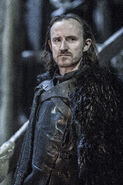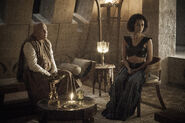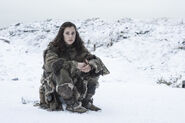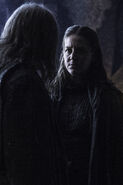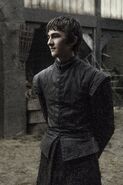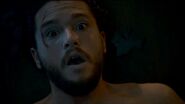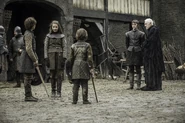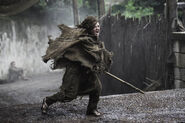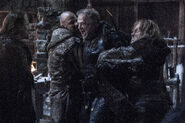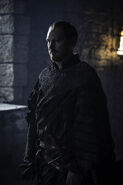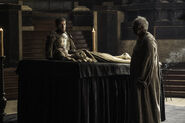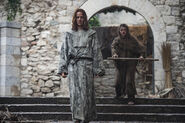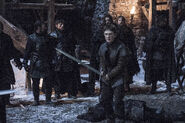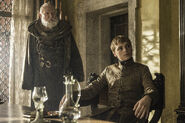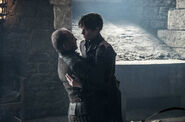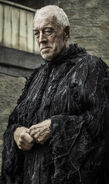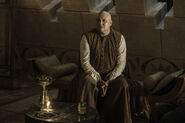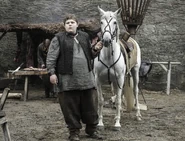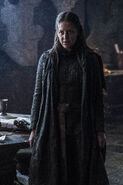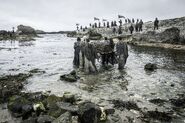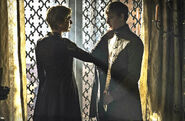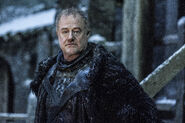"Home" is the second episode of the sixth season of Game of Thrones. It is the fifty-second episode of the series overall. It premiered on May 1, 2016. It was written by Dave Hill and directed by Jeremy Podeswa.
Plot
Template:S06E02 Synopsis
Summary
Beyond the Wall
Bran Stark continues his training under the Three-Eyed Raven at the tree. He is shown a scene from Winterfell, watching his father and Uncle Benjen training in the yard as young boys. He also sees his Aunt Lyanna and Hodor before he became simple, when he was known as Wylis. Though Bran wants to stay, he is dragged out of the vision by the Three-Eyed Raven, who warns him that it is dangerous to stay too long in such visions. Outside the tree, Bran finds Meera Reed, who still appears to be in mourning over her brother's death. Though Meera questions the point of her presence during Bran's training, Leaf states that Bran will need her when he leaves the tree.
At King's Landing
In a tavern, a man drunkenly boasts of having taunted Cersei during her walk of atonement to the great amusement of the other patrons. After he finishes his story, he leaves the tavern to urinate against a wall outside. As he is urinating, he is confronted by Ser Gregor Clegane, who kills him by smashing his head against the wall. Ser Gregor returns to Cersei's side following the murder.
Myrcella's funeral is held at the Great Sept of Baelor but Cersei cannot attend. Tommen has ordered that Cersei be confined to the Red Keep since he is concerned that the Faith Militant will re-arrest her if she steps inside the sept. In the sept, Jaime and Tommen talk about Myrcella and Prince Trystane. Tommen believes that Cersei is to blame for Prince Trystane's death but tells Jaime that he isn't upset with her. Jaime convinces Tommen to go see his mother and apologize to her as the High Sparrow enters the sept. After Tommen leaves, Jaime begins threatening the High Sparrow and asks him why Cersei is being punished for her sins, but he isn't, considering he murdered the king he vowed to protect. As Jaime is about to kill the High Sparrow, the High Sparrow seems to be unafraid to die, which confuses Jaime. The High Sparrow explains that if Jaime chooses to kill him then many of the sparrows will die fighting him, but it wouldn't really matter since they have no names or individual power. He says that they mean nothing individually, but together they can overthrow an empire.
Tommen visits Cersei in the Red Keep and apologizes for not being more assertive during her imprisonment. He regrets letting the High Sparrow lock her away and says that he should have torn the sept down with the High Sparrow inside of it. He tells her that he needs her help in being a strong ruler. Cersei remains uncharacteristically silent throughout the exchange, but when Tommen is done speaking, she embraces him.
In Meereen
Missandei and Grey Worm tell Tyrion that Rhaegal and Viserion have not been eating ever since Daenerys left. Tyrion explains that dragons do not do well in captivity and they will probably start eating again if they are unchained. He also suggests that dragons are intelligent enough to remember their friends, and that they will probably not harm Missandei if they meet her again, since she spent so much time with them when they were little. Tyrion and Varys go down below the pyramid, with Tyrion advancing into the darkness alone. One of the dragons emerges from the shadows and Tyrion maintains eye contact. When the other emerges, Tyrion puts down his torch and gently advances. To calm them, Tyrion talks gently about a time when he was little, and asked his uncle for a dragon – not even a large one, just a little one like him. They all laughed, then Tyrion's father told him dragons were extinct, and Tyrion says he cried himself to sleep that night. At this point, Tyrion is finally close enough to release the locking pin on the second dragon's collar. The other advances on him, then gingerly turns his head to the side so Tyrion can free him as well. The dragons retreat, and Tyrion hastily returns to Varys. Tyrion instructs Varys to punch him if he ever suggests doing anything like that again.
In Braavos
Still a beggar on the streets, Arya is again approached by the Waif, who asks her name. Arya says she is "no one", at which the Waif hits her. The Waif retorts that she doesn't believe that and neither does Arya. She tries to fight back, but the Waif vanishes, replaced with Jaqen H'ghar. He promises that if she says her name, Arya will sleep under a roof that night, that she will eat, and he will restore her eyes. Each time however Arya says she has no name. Satisfied, he tells Arya to follow him, and that she is a beggar no more.
In the North
At Winterfell, Ramsay and Roose discuss plans with Harald Karstark regarding what to do about Sansa. After Ramsay suggests storming Castle Black, Roose warns Ramsay that such an action would turn the entire North against House Bolton implying that if he does not act more sensibly he will be discarded. At that point, Maester Wolkan enters and announces that Roose's wife, Walda, has given birth to a baby boy. Ramsay, realizing that his position is weaker than ever, stabs his father to death and, in his position as the new Lord Bolton, he personally feeds Walda and his half-brother to the hounds.
In the woods, Brienne fills Sansa in on her encounter with Arya, whilst Sansa is reluctant to talk about her experiences under Ramsay Bolton's tyranny at Winterfell. She admits that she ought to have accepted her help sooner. Then Theon, wracked with guilt over his betrayal of the Stark family, decides to leave the group and go home. He tells Sansa that Brienne and Pod will do a better job of looking after her, though he tearfully states that he would have gone with her all the way to Castle Black if necessary. He asks to take one of the horses with him, and the two share an embrace.
In the Iron Islands
At Pyke, Yara Greyjoy reads a letter to King Balon Greyjoy about how Glovers retook Deepwood Motte and killed all of the Ironborn who held the castle. Yara notes that their invasion is now a definite failure since Deepwood Motte was the last stronghold that the Ironborn held in the North. Balon tells her that they will continue fighting, but Yara argues that invading the North is pointless since they are unable to hold the strongholds they conquer against the mainland armies and the strongholds in the mainlands aren't really valuable to the Ironborn because they are so far away from the sea. Balon says that one of the reasons that the invasion wasn't successful was because Yara wasted men when she attempted to rescue Theon, which she says she will not apologize for. Yara continues to try to convince Balon to end the rebellion, saying the only reason they were able to take strongholds in the North in the first place was because the Northerners were in the south fighting a war, and now that war is over. She reminds Balon that the last time they provoked the Northerners too far they were crushed and her two oldest brothers were killed. Balon tells her that when she rules she can be content with their current standing, but for now she needs to obey his commands or he will make another heir who will.
Balon starts walking on the swinging rope bridge that separates the two of the towers of Pyke. Through the storm, he sees a man standing on the bridge who is blocking his way. He tells the man to get out of the way, but the man reveals himself to be Balon's younger brother, Euron Greyjoy. Balon tells him that he's surprised that he's still alive, and Euron mocks the Drowned God, telling Balon that he is the Drowned God. Balon explains that he heard a rumor that Euron lost his senses during a storm and his crew had to tie him to the mast of the ship to prevent him from jumping overboard. Euron doesn't deny the rumor, and explains to Balon that he cut the tongues out of all of his crew members because he wanted silence. Euron then says that Balon is too old to rule and that he's been ruling long enough and it's someone else's turn. Balon tells Euron that he isn't a true Ironborn because he lost his wits during a thunderstorm and tries to stab him, but Euron throws him off the rope bridge to his death.
At Balon's funeral, Yara tells the priest, Aeron Greyjoy, Balon's youngest brother, that she will find the person who did this and feed them to sharks while they're still alive. She swears to do this upon the Salt Throne and Aeron explains to her that she isn't the ruler yet, because the law says that the Kingsmoot chooses the next ruler. Yara argues that her father wanted her to rule, but Aeron says that he doesn't make the law.
At the Wall
At Castle Black, nightfall has arrived and the band of black brothers loyal to Jon have not yet surrendered. When Davos refuses a final ultimatum from Ser Alliser Thorne, the acting Lord Commander orders the door to be battered down with a sledgehammer. Before the mutineers can break in however, Edd returns with Tormund Giantsbane and an army of wildlings. Though Thorne demands that the watchmen stand and fight, but they are intimidated into surrender by the giant, Wun Wun, enabling an almost bloodless takeover; only two watchmen die resisting the Wildlings, who have no casualties. Thorne, plus Olly and the officers who mutinied alongside him, are led away to the Ice Cells. As Tormund inspects Jon's corpse, Davos visits Melisandre, who is still gripped by a crisis of faith. When he asks her if reviving Jon is a possibility, she admits to having seen it done, but insists that she cannot do it, having lost faith in the Lord of Light due to the failure of her predictions regarding Stannis Baratheon to come true. After Davos implores her simply to try, she agrees. After washing Jon's wounds clean and burning his hair, she attempts to revive him using murmured High Valyrian incantations, but it seems they have no effect. After a moment, Tormund leaves, and Melisandre offers a final "please" in the common tongue, but leaves the room, despondent. Edd and finally, Davos, follow her a moment later. Once the room is empty however, Ghost, who had been sleeping underneath the table upon which Jon lay, perks up, and Jon revives suddenly, gasping for air.
Appearances
- Main: Home/Appearances
First
Deaths
- Two unnamed members of the Night's Watch
- Drunkard in King's Landing
- Lord Roose Bolton
- Lady Walda Frey
- Unnamed Bolton newborn
- King Balon Greyjoy
Production
Cast
Cast notes
- 19 of 29 starring cast members appear in this episode.
- Starring cast members Emilia Clarke (Daenerys Targaryen), Aidan Gillen (Petyr Baelish), Natalie Dormer (Margaery Tyrell), Indira Varma (Ellaria Sand), Diana Rigg (Olenna Tyrell), John Bradley (Samwell Tarly), Jerome Flynn (Bronn), Hannah Murray (Gilly), Michiel Huisman (Daario Naharis), and Iain Glen (Jorah Mormont) are not credited and do not appear in this episode.
- This episode is the final appearance of starring cast member Michael McElhatton (Roose Bolton) due to the death of his character.
Notes
- The episode's title refers to both Bran Stark enjoying a vision of the past at his home in Winterfell, and Theon, who decides to depart from Sansa and head "home" (to the Iron Islands).
- Dorne does not appear in this episode. Daenerys Targaryen, captive among the Dothraki, does not appear though the characters she left behind in Meereen do. House Tyrell, the Small Council, Petyr "Littlefinger" Baelish, and the Samwell Tarly/Gilly subplots do not appear either.
- Jon Snow has been resurrected by the Red Priestess Melisandre. His connection to his direwolf, Ghost, might have had something to do with the process.
- This episode reveals that Arya Stark isn't irreversibly blind, the Faceless Men of course have an antidote if someone is poisoned using one of their masks, they just didn't give it to her as a punishment and also a test.
- This episode marks the return of House Greyjoy and the Iron Islands as a major subplot. After their introduction in Season 2, the Greyjoys were barely seen again in the subsequent three seasons - indeed, entirely absent from Season 5 (not counting Theon). In the books, the Greyjoys do not prominently feature in the third novel either, and because it was the longest novel it was split across two TV seasons (Season 3 and Season 4), so they weren't really predicted to appear prominently in those. Apparently to keep them on screen to some extent, the TV series invented the sideplot of Balon and Yara receiving a taunting letter from Ramsay (and a box containing Theon's severed genitals) in the Season 3 finale, prompting her to announce that she would mount a rescue attempt against the Dreadfort. When this actually came in Season 4's "The Laws of Gods and Men" it was a brief sequence that lasted only three minutes and ended in failure as she was chased away by Ramsay's hunting dogs. While the Greyjoys didn't appear much in the third novel, they returned very prominently in the fourth novel with a major new subplot, spurred by the introduction of Balon's younger brother Euron, and Asha (Yara in the show) herself becomes a POV narrator. This extended into the fifth novel. The showrunners, however, chose to condense both the fourth and fifth novels into Season 5, resulting in the Greyjoys making no appearance at all, until it was revealed that their subplot actually would be in the TV series, albeit pushed back to Season 6.
- This episode marks the introduction of Euron Greyjoy, Balon's younger brother and uncle to Theon and Yara. The TV producers were unsure if they would ever be able to introduce the large Iron Islands subplot from the fourth novel back when they were making Season 2, so even when Theon meets his family again at Pyke, mention of his uncles was simply omitted, rather than waste time setting up a subplot which might not ultimately get to appear. For Euron this was largely irrelevant because he wasn't in the islands at the time, but in the book version the baptism ceremony that Theon undergoes was conducted by his youngest uncle, the priest Aeron "Damphair" Greyjoy - thus when Theon's baptism ceremony appeared in Season 2's "What is Dead May Never Die", it was simply conducted by an unnamed Drowned Priest, not his uncle Aeron.
- On-screen dialogue in this episode doesn't actually state it, but the HBO Viewer's Guide and official promo photos for upcoming episodes confirm that the Drowned Priest that Yara talks to in this episode is indeed her uncle Aeron Greyjoy. There was a third uncle in the novels, Victarion - commander of the Iron Fleet - but he appears to have been adapted out and some of his actions condensed with Yara's.
- Theon's uncles were vaguely mentioned on-screen in the TV series at one point before this, way back in Season 1 episode 4 "Cripples, Bastards and Broken Things", in a scene invented for the TV show in order to introduce the backstory about the Greyjoy Rebellion. As Tyrion is leaving Winterfell he encounters Theon near the stables, and mocks him for how the last living son of Balon Greyjoy has become a "lackey" (Ward) for the Starks. Tyrion remarks that he remembers the rebellion nine years before, and watching as the ironborn burned the Lannister fleet at anchor in the Raid on Lannisport. Tyrion says that Theon's "uncles" were responsible, but didn't mention their names (an intentionally vague line so the writers could keep their options open). Tyrion's exact words were: "I still remember seeing my father's fleet burn in Lannisport. I believe your uncles were responsible."
- Euron Greyjoy is called "Crow's Eye" in the novels because he wears an eyepatch over his left eye. It is unknown what is beneath the eyepatch, an empty socket or an eye; Theon muses that it conceals an eye which he describes as "shining with malice", but he does not know that for sure. His right eye is blue. In the TV show, Euron has no eyepatch and still has both eyes.
- Yara Greyjoy accurately and succinctly criticizes her father's overall war strategy: opportunistically attack the North while its army was away fighting the Lannisters in the south, then just wait for events to sort themselves out. Even Theon back in Season 2 criticized Balon for this, because it would gain little, and when the war on the mainland eventually ended, either the Starks or Lannisters would turn their full attention to the Greyjoys. Yara's remark about sending men to die for "pinecones and rocks" is part of a longer speech in the novels, in which she has her men dramatically dump treasure chests filled with actual pinecones and rocks at the feet of the assembled ship captains: a sarcastic display of the "riches" that trying to conquer the North has brought them, paid for with blood. Instead of trying to seize the foodstuffs of the Reach or mines of the Westerlands, they are losing men from attrition trying to hold on to poor, barren lands in the North simply because they were easy to capture at first.
- Balon's attempt to brush off that his failed strategies are his own fault and instead shift blame onto his own children is of course both petty and easily brushed aside by Yara herself. Both Theon's capture of Winterfell and Yara's (TV-only) assault on the Dreadfort to try to rescue Theon were lightning raids made with small forces which had only minimal effect on the total losses they have been taking: Theon only took one ship with twenty men (all dead except Theon), and Yara also only took one ship with fifty men (losing many). The losses Balon's children made in these raids only measured in the dozens - when at Balon's order hundreds of ironborn died trying to hold on to Moat Cailin and now Deepwood Motte. As summed up in their exchange, when Balon angrily asks where is Theon now (and the few dozen men she lost trying to rescue him), Yara retorts by asking where is the entire kingdom he just lost.
- Yara angrily warns her father that the wars on the mainland are drawing to a close, and the mainland powers will soon turn their attention back to them - specifically reminding him what happened the last time they provoked the mainland powers too far in the Greyjoy Rebellion and they lost. She says that she watched from this very castle tower during the Siege of Pyke as enemy armies broke in, and she lost "two" of her brothers that day (and Balon says "three", because after Theon was taken as a ward he considered the boy dead to him). The two older Greyjoy brothers who died in that war were Rodrik Greyjoy and Maron Greyjoy - but actually, in both the books and supplementary materials for the TV series, it is stated that while both of them died in the war, both of them didn't die "that day" during the Siege of Pyke. Maron died in the Siege of Pyke, but Rodrik died earlier in the war at the Battle of Seagard. Of course, given that Balon and Yara are outright shouting at each other about this, they are probably just speaking loosely about the fine details in their anger.
- Yara reads a letter informing that House Glover retook their castle-seat at Deepwood Motte from the ironborn who held it, and this was their last stronghold that they had captured in the North since the war began. Yara personally led the assault to capture Deepwood Motte back in Season 2. In the novels, Deepwood Motte is liberated by Stannis Baratheon, reinforced by the Northern Mountain clans, nearly all of Yara's troops are destroyed and she is taken captive, but there is one more stronghold still held by the ironborn in the North: Torrhen's Square, which was mentioned as being attacked by the ironborn in Season 2, and in the books was taken by Dagmer. As of the most recent novel, Dagmer still holds Torrhen's Square. The TV series apparently just condensed this so Torrhen's Square was liberated off-screen, and officially the ironborn have no more presence in the North.
- In the novels, the liberation of Deepwood Motte is the one time so far that House Forrester has been mentioned in the main narrative - a minor House who serve as vassals to House Glover, who are the main characters in the tie-in video game Game of Thrones: A Telltale Games Series. After Deepwood Motte is liberated, Lady Sybelle Glover provides Stannis with guides and "hunters sworn to Deepwood with clan names like Forrester and Woods, Branch and Bole." A future "season" of the Telltale video game might tie-in with these off-screen events - though the first "season" of the game was set during Season 4 of the TV series, so these events around Deepwood Motte and the Wolfswood would correspond to a potential third season of the video game.
- This episode also marks the return of Bran Stark and his companions at the cave of the three-eyed raven, after their storyline took the year off in Season 5. As the showrunners explained, Bran's material largely caught up with the current novels by the end of Season 4: it had less material than other subplots so they adapted it at a faster pace relative to the other storylines. They felt that Bran finally meeting the three-eyed raven was a very good stopping point, and combined with the large number of storylines being condensed into Season 5, it really made sense to just leave his subplot "on hold" and return in Season 6 once he had made more progress in his magical training.
- There was one chapter left from the fifth novel, after Bran meets the three-eyed raven, in which he has numerous magical visions of the past. The TV series is stretching this out through much of Season 6, also using it as a framing device to portray some flashback scenes which other characters (such as Eddard) had in the novels but which were omitted until now.
- The "three-eyed raven" appeared only once before back in the Season 4 finale, played by Struan Rodger. For the character's return this season the role was recast, and is now played by veteran Swedish-French actor Max von Sydow.
- During the flashback scenes in Bran's vision of Winterfell, he states that the two young boys sparring are his father Eddard Stark and his younger uncle Benjen Stark. The young man overseeing their training is not their eldest brother Brandon Stark (Bran's uncle and namesake) as might be assumed, but is actually a young Ser Rodrik Cassel, Winterfell's Master-at-Arms who appeared in Seasons 1 and 2 (Theon even directly recalls that he killed Rodrik in Season 2). Note that young Rodrik has the characteristic long sideburn whiskers which he will grow out even further as an old man when he appears in Season 1.
- Lyanna Stark first appears in flashback deftly riding a horse at a young age - a detail from the novels, in which other characters recall that she was a tomboy (not unlike her niece Arya) who was one of the best riders in the North, male or female. Note that Lyanna even wears a boy's clothing and riding gloves (women don't dress like this when they are seen riding). Cordella Hill, who plays young Lyanna, even resembles Maisie Williams to some extent - in the novels Eddard tells Arya that she very closely resembles what his sister looked like at her age.
- Lyanna remarks that young Eddard is soon going to have to leave Winterfell and go to the Eyrie. Among the nobility in Westeros, it is customary to send young boys of a certain age out to "foster" at an ally's castle as wards, where they live and train for several years. In some respects similar to being sent off to boarding school, this is meant to help boys grow into young men, giving them a sense of the wider world and an opportunity to forge lasting friendships with members of other Houses and thus strengthen alliances. Eddard was sent to foster at the Eyrie under its then-Lord Jon Arryn, who became almost a second father to him, and it was there that he met fellow ward Robert Baratheon and began their lifelong friendship. In the TV series, Eddard and Robert previously mentioned how they fostered at the Eyrie back in the Season 1 premiere, and later in Season 4's "Mockingbird" Lord Yohn Royce remarked to Eddard's daughter Sansa who Eddard fostered at the Eyrie and forged lasting friendships with many Vale lords including himself.
- The scene where Young Ned spars with Young Benjen is a callback to a scene from Season 5's "The Wars to Come" where Jon Snow trains Olly in sword and shield combat. Both Ned and Jon knock their sparring partners to the ground. Upon helping them up, Ned/Jon put their hands or the side of Benjen/Olly's heads, telling them to "Keep your shield up, or I'll ring your head like a bell," before tussling their hair.
- This episode reveals that Hodor's real name is actually "Wylis", and he used to be able to speak normally. Apparently he suffered some sort of accident in later years that rendered him a lackwit (mentally handicapped). "Hodor" is just a nonsense word he says, and because it is the only thing he can say it eventually stuck as a nickname.
- In the novels, Hodor's real name is actually "Walder", not Wylis. The TV series probably changed this to remove any confusion with Walder Frey. There is no reason whatsoever to think the two are related: "Walder" is just a very common name in Westeros (about as common as "Walter" in real life), and a dozen other characters are introduced in the narrative who happen to also be named "Walder" - many of them not even Freys. The TV series didn't have time to introduce all of these minor one-off characters, so if it actually called him "Walder" it would probably only have strengthened the implication that he's related to the only other "Walder" who has appeared before.
- The current novels have never actually stated how Hodor became mentally disabled - if he was born or lackwit or became one later through a brain injury of some kind. It is therefore possible that the revelation that Hodor could speak normally when he was a boy is actually a piece of spoiler information from a future novel.
- Actor Kristian Nairn, who plays adult Hodor, has a prominent tattoo on his right temple. As Hodor does not have a tattoo, the makeup department just applies fake scar makeup to his right temple to cover it up - apparently some injury "Hodor" the character took the in past. Notice that the actor playing young Hodor in he flashback has a matching fake scar piece applied to his right temple.
- Young Benjen's fearful remark about sparring with young Hodor because he's huge - "he's got giant's blood!" - repeats an earlier comment Osha made back in Season 1 jokingly wondering if Hodor is so large because he has some giant's blood in his ancestry. Similar comments are made in the novels, but it is has as-yet never been established that giants have ever actually interbred with humans.
- Old Nan reappears in flashback, though of course in the past she is called only "Nan". Sadly, Nan's fears about her great-grandson Wylis/Hodor entering the dangerous life of combat later turned out to be quite warranted: two of her sons will later die fighting for Eddard in Robert's Rebellion, and her grandson will die fighting for Eddard in the Greyjoy Rebellion, until Hodor is left as her only living relative.
- The appearance of the Children of the Forest has been drastically upgraded since they were last seen in the Season 4 finale - apparently due to a combination of advances in CGI while they spent the year off in Season 5, along with a significantly increased budget (up to $10 million per episode in Season 6). The redesign brings their appearance much closer to how it was described in the novels, as well as in the animated "Histories & Lore" segments featuring drawings of them: glowing slitted eyes like a cat's, nut-brown skin (spotted like a deer's), and overall less human-like facial features (the books also describe them as having four-fingered hands that end in claws, but they aren't visible in this episode). Some descriptions of the Children in the books imply that they look almost like humanoid squirrels (the name the giants call them literally translates as "little squirrel people").
- In the Season 4 finale, extensive CGI was actually used to soften the Children's appearances so they seemed much more rounded and infantile. Still, the previous episode didn't apply the other features that the Children prominently have in the books, such as their coloration - which somewhat implied at the time that the Children look white/Caucasian. This episode corrects this to portray them with the nut-brown skin and "dappled" (spotted) coloration described in the novels: the Children don't really look like any human ethnicity, as they are a non-human race altogether.
- Given that the Children have to be played by small child actors, but the characters themselves aren't supposed to age, the character Leaf has understandably been recast, and is now played by Kae Alexander. Again raising the issue that the Children aren't really any human ethnicity, original actress Octavia Alexandru is Romanian, but Kae Alexander is in fact Japanese.
- Roose Bolton is dead, killed by his own son Ramsay Bolton, who feared that due to Roose having a new lawfully born son with his wife Walda, he would disinherit him for his failures.
- Roose suspected Ramsay of killing Domeric, Roose's first trueborn son. If it is true (it probably is), then Ramsay has committed so far three kinslayings, four if killing relative-by-marriage (Walda) is considered as kinslaying.
- The massacre of multiple members of House Martell in the preceding episode wasn't in the novels and multiple major reviews made the criticism that it wasn't set up well or was included just for shock value. DVD commentary confirmed that this was a late addition to the story, in that the showrunners didn't even think the Dorne plot would appear in the TV series until after production on Season 4. In this episode, Ramsay massacred the rest of House Bolton - his own father, stepmother, and newborn half-brother - which might draw some parallels. Ramsay even brutally kills Walda and her newborn son with his hunting dogs. Any similarities end there, however: while Ramsay's actions in this episode are certainly very violent, they are very probably not an invention of the TV series, and are a culmination of a plotline set up long in advance. While the Bolton storyline in the TV series has surpassed the current novels, it is heavily implied that Ramsay might kill Roose in the next novel - for much the same reasons as in the TV show: Ramsay has proven time and again to be short-sighted and impulsive, Roose has lost faith in him, and Roose might make any child he has with Walda his heir instead (Roose outright expresses his fear that Ramsay will try to kill any children he has with Walda).
- In the "Inside the Episode" featurette, David Benioff directly points out how this was not an impulsive spur-of-the-moment decision by Ramsay, citing that this was set up long in advance as a growing tension ever since Walda announced she was pregnant in Season 5's "Kill the Boy". Benioff further explained how this wasn't meant to be an unexpected or gratuitous "surprise" by pointing out how Lord Karstark doesn't even flinch when Ramsay stabs Roose in front of him: it had become obvious to characters around the Boltons that inevitably, either Ramsay would kill Roose and the rest of his family, or Roose would disinherit and/or kill Ramsay.
- Walda's baby is the second of Ramsay's trueborn half-brothers that he killed, to make sure he remains Roose's only heir: Roose suspected, and was probably right, that Ramsay killed Domeric, Roose's first trueborn son. Domeric wasn't mentioned in the main live-action episodes but was mentioned in the tie-in Telltale video game (by Ramsay himself, voiced by his live-action actor, Iwan Rheon).
- The episode has Roose call Ramsay his "firstborn son" - it apparently isn't coordinating with the video game which did mention Domeric's existence from the novels. That being said, it is possible to interpret this as just Roose speaking loosely: in this context his point is to say that he will always consider Ramsay his eldest surviving son and thus heir compared to his infant son with Walda.
- Benioff also pointed out in the "Inside the Episode" featurette that Ramsay was taught to betray Roose by his father's own example: that betrayal is always justified if it ensures your own survival in power, no matter what taboos you break. When Robb Stark started losing against the Lannisters, Robb became an obstacle to Roose's ongoing political survival (as he would have dragged Roose down in defeat with him), so Roose ruthlessly betrayed and personally killed Robb at the Red Wedding - even if it meant taking part in an unthinkable violation of sacred guest right. In direct parallel, by threatening to disinherit Ramsay in favor of his new infant son, Roose has made himself an obstacle to Ramsay's ongoing survival in a position of power - so by the example Roose himself set, his own son killed him, similarly not caring about breaking a grave social taboo (in this case, kinslaying). Adding to the ironic/karmic nature of Roose's death, Ramsay even kills him in similar fashion to how he killed Robb Stark: hugging him close and plunging a dagger through his heart.
- George R.R. Martin himself remarked in the Season 5 featurette on "Bastards of Westeros" that Roose and Ramsay are something of a dark foil to the relationship between Eddard Stark and Jon Snow. Roose derided Ramsay for his bastard status, and through his actions taught him to betray anyone and break any rule if it meant securing power for yourself. In contrast, Eddard taught his sons about honor and the responsibilities of command, that "the man who passes the sentence must swing the sword" - a lesson Jon put into effect when he executed Janos Slynt in Season 5. Both bastards were molded by the lessons their fathers taught them.
- Harald Karstark debuts in this episode as the new head of House Karstark, following Lord Rickard Karstark's execution by Robb Stark back in Season 3. Harald is actually a condensation for the TV series of several different Karstark characters who had a longer subplot in the novels. This episode confirms that Harald is Rickard's own son, not a cousin, etc. In the books Lord Rickard had three sons: Harrion, Torrhen, and Eddard Karstark. The second two were killed by Jaime Lannister. The TV series apparently thought it would be too confusing to have more than one character named "Eddard" like Eddard Stark, so it moved the names around, instead stating that Harrion and Torrhen were killed by Jaime. In the books Harrion was captured by the Lannisters (it is unknown where he is held, and whether he is still alive) while Rickard's old uncle Arnolf sides with the Boltons. The TV series simply condensed this and moved around the names of the sons - thus "TV-Harrion" died like "Book-Eddard", while "Harald" in the TV version is like "Book-Harrion" merged with uncle Arnolf.
- Brienne of Tarth's storyline was condensed in the TV series with the North/Bolton subplot, and on top of this she never actually ran into Arya Stark as she was leaving the Vale with the Hound, nor has she ever met Sansa. Thus in the novels, Brienne doesn't know that Arya is still alive, and even if she did know she isn't in a position to tell Sansa.
- The scene between Tommen Baratheon and Jaime Lannister goes some way to explaining why the Sand Snakes waited to kill Trystane Martell until his ship was still in Blackwater Bay outside King's Landing: it was so everyone would suspect Cersei ordered it. While the Dorne/Martell storyline has been drastically changed from the novels by this point, at the end of the most recent novel Doran Martell (who was now working with the Sand Snakes after revealing he was plotting against the Lannisters the entire time) sends several of them to infiltrate King's Landing and stir up trouble between the various factions there, i.e. Cersei, the Small Council, the Tyrells, and the Faith Militant, probably by conducting various assassinations and framing different parties in the city for it. This episode also confirms in dialogue that Trystane's ship was still outside the city - the previous episode didn't make it clear in dialogue exactly where his ship was.
- Official promo images for this episode show that at one point King Tommen was going to meet with Grand Maester Pycelle - ultimately this was either deleted or shifted to another episode.
- Varys states that both Yunkai and Astapor have been retaken by the slave-masters. Back in Season 4 Daenerys received news that the slave-masters had already retaken Yunkai (though later they were at least willing to enter a peace agreement with her in Season 5), while the council she set up to rule over Astapor was overthrown by a former butcher named Cleon who declared himself emperor (the books explain the details that Cleon leads an army of vengeful freedmen who re-institute slavery - just with the roles reversed and the former slave-masters as the new slaves). The political machinations with Yunkai and Astapor were a much longer subplot in the novels but the ultimate end-point is the same. In the books, a plague breaks out in Astapor which decimates its defenses and it eventually falls to Yunkai's reformed army after a siege. Most of the population is killed in the ensuing bloody sack of the city, though afterwards Yunkai is devoting resources to try to rebuild Astapor.
- Tyrion Lannister's musings on the nature of dragons are given more time in the books and also by other characters, such as Daenerys and Barristan Selmy. In the novels, given that Tyrion doesn't have much to do on his long journey to Meereen after leaving Pentos, he spends time starting to write his own book on dragon-lore (he made the journey by river-boat in the books, by a boring ride in a wheelhouse in the TV series). As Tyrion mentions in the episode, he was fascinated by dragons as a child (as many young boys are), and he actually read up extensively on the subject, even reading several rare books and manuscripts in the Red Keep about them. As Tyrion explains in the episode, the first three dragons that Aegon I Targaryen used to conquer Westeros were massive, but his descendants started chaining them up (in the Dragonpit in King's Landing, as explained in the "Histories and Lore" featurettes), and subsequent generations grew smaller and smaller until the last two were stunted creatures that died young at only the size of cats. The discussion about chaining up the dragons in enclosures is had by Daenerys, Barristan, and Jorah in the novels, though Tyrion also muses on it: they disagree that this is necessarily what made subsequent dragons smaller, as by that logic men who live in small huts would be small and those who live in castles would grow to be giants. Others suspect it was the heavy inbreeding that harmed their health (there were only three dragons left when the Targaryens came to Westeros, and all descended from them).
- Tyrion's point about dragons being very intelligent and that they will respond well to perceived acts of kindness as a result are touched upon in the novels. Dragons do seem to be very intelligent, more than dogs or horses, and some maesters speculate that they might even be as intelligent as humans - but no one has been able to successfully test this. Dragons are very fickle creatures, however, and their behavior is enigmatic - given that, after all, they are inherently magical creatures and magic is often beyond human comprehension. George R.R. Martin described it as an "alien intelligence" - possibly more in tune with magic/nature/fate, but ultimately inscrutable to humans. Tyrion's general point seems to be true, that it is wrong to think of them as just over-sized unthinking reptiles.
- Dragons in the novels are often most comfortable around people descended from the Targaryen bloodline, even Targaryen bastards - though many Targaryens were also roasted alive attempting to bond with dragons. In the books, Doran Martell's son Quentyn travels to Meereen and tries to free one of the dragons, hoping that the fact one of his ancestors married a Targaryen a century before gives him enough Targaryen blood for the dragons to trust him - he was wrong, however, and the dragon burned him alive. This has led to rampant speculation that Tyrion might not actually be Tywin's son but a bastard of the Mad King himself fathered on Tywin's wife Joanna - given that Tywin's dying words after Tyrion shoots him are to spitefully say, "You are no son of mine!" This theory is very controversial despite its popularity because there is a lot of other evidence against it, such as that Tywin's wife Joanna hadn't even been living at the royal court anymore for years and had no contact with the Mad King around the time Tyrion was conceived.
- Tyrion recalls being told as a child that the last dragon died over a century ago. The last Targaryen dragon died about 150 years before the TV series, and most died during the Dance of the Dragons 170 years ago. Of course, Tyrion was told this around 25 years ago when he was a child, and the last dragon died out around 125 or so years before, so "a century" ago was simply rounding down at the time.
- Tyrion says that "one of my uncles" informed him as a child that the dragons had died out a century before. In the novels, Tywin actually had two younger brothers besides Kevan, the other two being Tygett and Gerion, but they haven't been established in the TV continuity (both died years before the events of the main narrative). Tyrion did also have a maternal uncle, Stafford, who was killed off-screen by Robb Stark's army in Season 2. Given that it was already established that Tyrion had multiple "uncles" in the TV continuity - Kevan and Stafford - his intentionally vague line in this episode doesn't really establish/introduce that Tygett existed in the TV continuity.
- With Balon Greyjoy's death, all five kings from the War of the Five Kings are now dead. Unlike in the show, in the books he is the second to die, following Renly.
- With Balon's death, all the three kings against whom Stannis performed the blood ritual in "Second Sons" - are now dead.
- In this episode, the show continues its pattern of killing off at least one king per season: season 1 - Robert; season 2 - Renly; Season 3 - Robb; Season 4 - Joffrey; season 5 - Mance Rayder and Stannis; season 6 - Balon.
- In the books, there is a common belief/superstition that Harrenhal is cursed. Jaime and Littlefinger, both of them rational and sensible, pointed out that the Lothstons and all the other houses whose seat was Harrenhal - were destroyed one after another, and every individual who ever served as its castellan - was killed: Lady Whent, Tywin, Amory Lorch, Vargo Hoat (Locke in the show), the Mountain and Polliver. The only exception is Roose Bolton, who has somehow evaded the curse by the point the books reached (Bonifer Hasty doesn't count because he has just moved there, too soon for the curse to take effect). Roose's death in the show underscores the possibility of the curse.
- Tommen suspects Cersei of killing Trystane. Curiously, while is the show there is no evidence (so far) to connect Cersei to the murder - in the books she indeed plots to assassinate Trystane, and the Sand Snakes and Ellaria do not have any ill intentions toward him (neither toward Myrcella and Doran); someone in King's Landing notifies Doran of Cersei's scheme, and it is foiled. The Sand Snakes are stunned and shocked to hear that Cersei intended to murder their cousin.
- Davos has always loathed Melisandre's dark witchcraft. His request of her to revive Jon is not inconsistent; Davos has flexible personality and he knows that sometimes it is necessary to compromise and bend rules, in sharp contrast to Ned Stark who learned that lesson only when Sansa's life was in danger, too late to save himself and to prevent the war. So far, Davos's attitude proved to be better than Ned's: Davos's fleixibility saved many innocent lives - the residents of Claw Isle, Edric Storm (in the show he was replaced with Gendry), the defenders of Castle Black and the people of the north, who would have been suffer greatly had the wildlings defeated the Night's Watch. Ned Stark's actions, on the other hand, caused death of many people (Robert, Jory, people of the Riverlands, his guards, etc.) due to his stubborn refusals to have Tyrion freed and to follow Renly's advice to take over while Robert was dying, and in general to bend himself. He has not done it maliciously, of course, but because he was too certain he knew what was the right thing to do.
- Ramsay's suggestion to attack Castle Black is perhaps a nod to the Bastard Letter, received by Jon near the end of book 5, in which Ramsay threatens to attack Castle Black. Several anomalies about the letter (mainly the fact that Ramsay's "calling card" is not enclosed) led to fan speculations it was someone else who wrote the letter.
- Ramsay has made it clear to Roose how he feels about his future trueborn sibling. Roose knows well what psychopath homicidal monster Ramsay is, and that he is not above kinslaying. How come the cold and calculating Roose has not taken any precautions to protect Walda and her newborn son?
In the books
- The episode is adapted from the following chapters of A Storm of Swords:
- Chapter 45, Catelyn V: Balon Greyjoy is reported to have died after falling off a bridge in Pyke.
- The episode is adapted from the following chapters of A Dance with Dragons:
- Chapter 26, The Wayward Bride: Deepwood Motte is retaken from the Ironborn.
- Chapter 34, Bran III: Bran Stark uses the power of Heart Trees to look into the past.
- Chapter 45, The Blind Girl: after being rendered blind by the Faceless Men, Arya continues her training with her remaining senses.
- Chapter 68, The Dragontamer: one of Daenerys's suitors pays a visit to the dragons in the catacombs in Meereen.
- The episode is adapted from the following chapters of The Winds of Winter:
- Chapter unknown, Theon I: Theon parts ways with Ramsay's bride and her helpers.
- The remaining material appears to be based on what will come in the novel, particularly the resurrection of Jon Snow and the death of Roose Bolton.
Image gallery
Video gallery
References
Template:Episodes navbox

